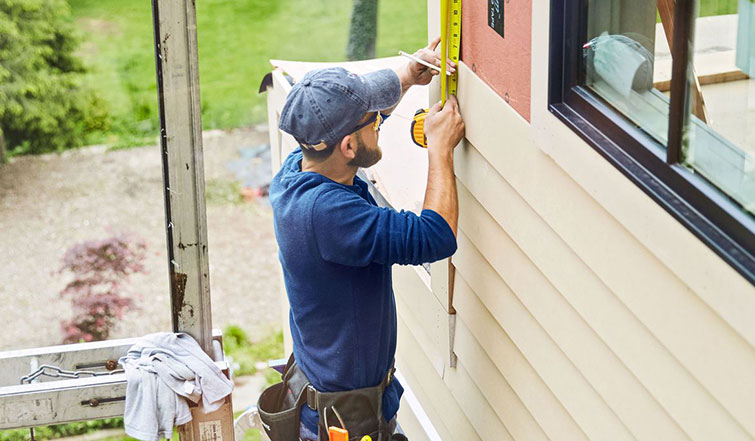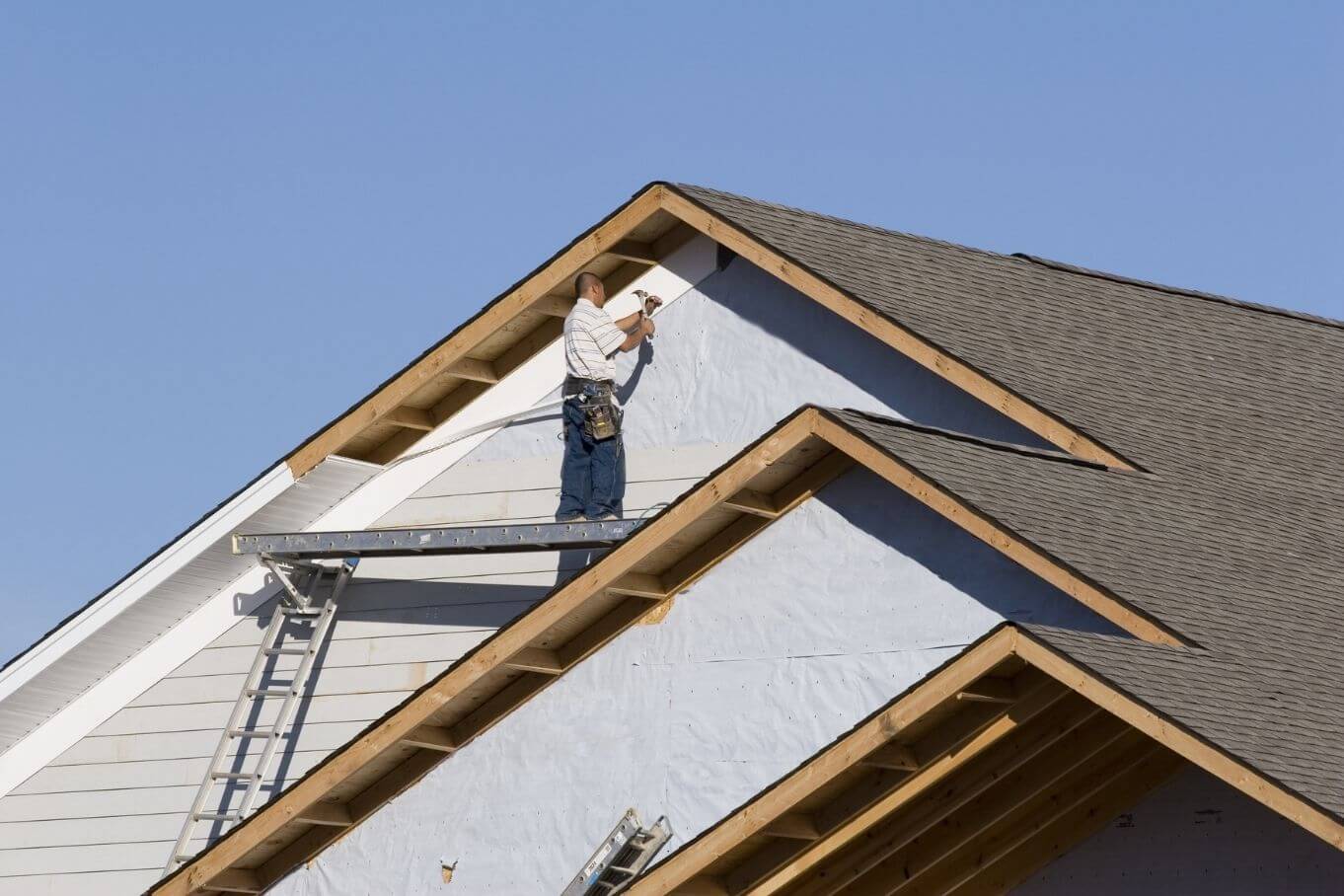Reliable Morris Siding Contractor Specializing in Residential Siding Projects
Reliable Morris Siding Contractor Specializing in Residential Siding Projects
Blog Article
The Crucial Overview to the Different Kinds Of Home Siding and Their One-of-a-kind Advantages
In the realm of home renovation, selecting the ideal home siding is an essential decision that affects both visual charm and practical efficiency. The variety of products readily available, such as wood, vinyl, fiber block, concrete, and metal, each offer distinct benefits that accommodate different demands and preferences. Recognizing these distinctions can considerably improve the longevity and value of a building - morris siding contractor. With so many options to consider, which siding product genuinely stands out for your certain task? Discovering these options can lead to informed decisions that straighten with both design and functionality.
Timber Exterior Siding
Wood home siding, a prominent option for domestic outsides, uses a timeless aesthetic that integrates natural elegance with architectural stability. This exterior siding material is offered in various styles, including clapboard, roof shingles, and board-and-batten, permitting house owners to customize their appearance to match their style choices. Timber siding is normally crafted from sturdy species such as cedar, redwood, or pine, which are understood for their resilience and capability to withstand ecological stressors.
One of the primary advantages of wood exterior siding is its exceptional insulation buildings, which can add to energy efficiency and lower home heating costs. In addition, timber home siding is eco-friendly, making it an eco-friendly option when sourced sustainably. Regular maintenance, including painting or discoloration, can lengthen its life-span and boost its look, permitting property owners to protect the all-natural charm of the wood.
However, prospective disadvantages include sensitivity to parasites, rot, and weather condition damages, requiring adequate treatment and upkeep - morris siding contractor. Regardless of these worries, when properly looked after, timber exterior siding can give a resilient and attractive solution that enhances the personality of a home while using a cozy, welcoming environment

Vinyl Siding
Vinyl siding has become a leading choice for home owners looking for a low-maintenance exterior choice that combines resilience and price. This functional material is crafted from polyvinyl chloride (PVC), making it resistant to different climate condition, including moisture and UV rays. Consequently, plastic home siding does not warp, rot, or fade, guaranteeing resilient aesthetic allure.
One of the main advantages of vinyl siding is its substantial array of styles and colors, allowing property owners to attain the desired seek their building without the need for frequent repainting. Additionally, vinyl exterior siding is very easy to set up, which can significantly reduce labor costs during building and construction or restoration projects.
Vinyl home siding also adds to power performance. Many choices attribute insulation backing, which enhances thermal efficiency, assisting to keep comfy indoor temperature levels and potentially lowering power costs. Its smooth surface area helps with simple cleansing, calling for only routine cleaning with a yard hose pipe to get rid of dust and debris.
Fiber Cement Home Siding
Fiber concrete siding has actually acquired traction among builders and property owners alike as a result of its exceptional mix of toughness and visual versatility. Made up of a mix of concrete, sand, and cellulose fibers, this exterior siding alternative is crafted to endure extreme weather condition conditions, including high winds, hefty rain, and temperature variations, making it a long-lasting option for residential outsides.

One of the key benefits of fiber concrete house siding is its resistance to parasites, such as termites, and its non-combustible nature, offering improved fire security. morris siding contractor. In addition, it is available in a broad range of styles, colors, and textures, enabling house owners to achieve their preferred visual without sacrificing efficiency
Another advantage is its low maintenance demands; fiber cement house siding typically needs paint or discoloration every 5-10 years, which is less frequent than various other products. Its durability adds to a lower overall price of ownership, as it reduces the need for frequent fixings or substitutes.
Inevitably, fiber cement home siding represents an excellent investment for those seeking a resilient, attractive, and functional exterior choice, integrating both form and feature to enhance the home's visual allure.
Steel Siding
The allure of metal exterior siding exists in its durable toughness and contemporary aesthetic charm, making it a popular selection for modern design. Available in products such as aluminum and steel, steel house siding supplies a variety of finishes and colors, permitting homeowners to accomplish a personalized appearance that matches their style vision.

Power performance is another significant benefit, as many steel exterior siding items are made with insulation choices that help regulate interior temperature levels. This can lead to reduced power prices with time. Additionally, metal home siding is commonly recyclable, making it an eco-friendly choice for sustainability-minded house owners.
The setup process for metal home siding can be reasonably simple, leading to a quicker turnaround time for building tasks. Overall, metal home siding integrates capability and design, making it a sensible option for those seeking a enduring and aesthetically attractive outside finish.
Block and Rock Siding
Block and rock exterior siding stands out as an ageless choice that improves the aesthetic appeal of any home. Recognized for their toughness and low upkeep, these products supply a phenomenal return on investment while raising the building's curb charm. Available in numerous shades, structures, and patterns, block and rock can be tailored to suit diverse building designs, from typical to modern.
Among the key benefits of block and rock home siding is their power effectiveness. Both products have natural insulating properties that help manage interior temperature levels, possibly lowering cooling and heating expenses. In addition, they offer premium fire resistance compared to various other home siding choices, adding to boosted security.
Another advantage is their long life. Block and stone can last for years, usually requiring marginal maintenance past periodic cleaning. Unlike timber siding, they are invulnerable to bugs and rot, making certain a long-lasting outside that withstands the elements.
Verdict
In summary, the choice of siding dramatically impacts a home's aesthetic appeal, power performance, and upkeep demands. Each kind of siding-- whether timber, vinyl, fiber concrete, steel, or block and stone-- supplies distinct benefits tailored to different property owner preferences and visit site environmental problems.
One of the main benefits of wood home siding is its excellent insulation buildings, which can contribute to power performance and lower heating expenses. Furthermore, wood home siding is naturally degradable, making it an eco pleasant option when sourced sustainably.One of the key benefits of steel siding is its resistance to numerous ecological elements.Energy performance is another considerable advantage, as numerous steel exterior siding items are designed with insulation choices that help control interior temperatures. Each kind of house siding-- whether timber, vinyl, fiber metal, brick, or concrete and rock-- supplies special benefits tailored to numerous home owner preferences and environmental conditions.
Report this page